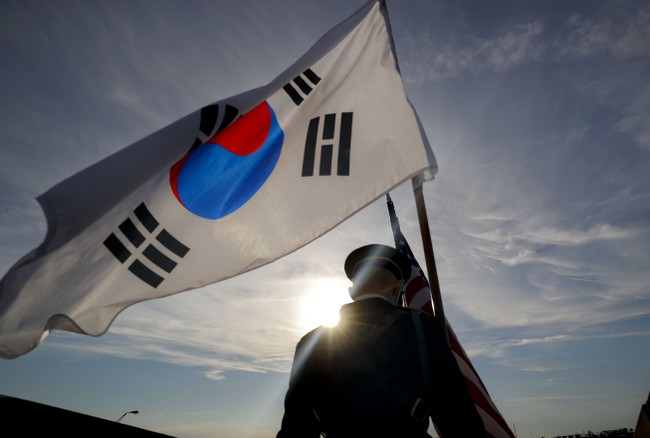
On April 4, 2025, South Korea’s Constitutional Court delivered a unanimous 8-0 verdict, upholding the impeachment of President Yoon Suk Yeol and stripping him from office. The decision, broadcast live to a nation on edge, stemmed from Yoon’s controversial and fleeting declaration of martial law in December 2024—a move the court deemed a “grave infringement of citizens’ rights” and an overreach lacking the legal basis of a national emergency. For Americans watching this unfold, the saga isn’t just a distant political drama; it’s a cautionary tale about the fragility of democracy, the dangers of unchecked executive power, and the geopolitical ripple effects that hit close to home.
KOREANS CELEBRATE PRESIDENT’S REMOVAL FROM OFFICE
Anti-Yoon protesters reacted with jubilation after the announcement of the Constitutional Court’s verdict on the impeachment of South Korean President Yoon Suk Yeol in Seoul on April 4, 2025.
South Korea’s Constitutional Court… pic.twitter.com/6ltCB15Klq
— Philstar.com (@PhilstarNews) April 4, 2025
Yoon, a former prosecutor and a conservative figure in South Korean politics, had argued that his martial law decree on December 3 was a necessary shield against “pro-North Korea anti-state forces” within the opposition Democratic Party, which he accused of paralyzing his government. To Americans, this resonates as a familiar struggle: a leader claiming to defend national sovereignty against perceived internal threats, only to face a backlash from institutions and a polarized populace. Yet, the court’s ruling—and the subsequent cheers from thousands of South Koreans outside the courthouse—underscored a stark reality: Even a well-intentioned power grab can unravel a democracy if it tramples on constitutional guardrails.
From an American wide lens, this matters deeply for several reasons. First, it’s a reminder of the Founding Fathers’ wisdom in crafting checks and balances. Yoon’s attempt to impose martial law, swiftly overturned by lawmakers as special forces stormed the National Assembly, echoes the kind of executive overreach that conservatives here often warn against—whether it’s a president like Biden bypassing Congress or weaponizing federal agencies. The South Korean court’s decisive action mirrors what many on the American right hope their own judiciary would do in a constitutional crisis: stand firm for the rule of law, not political expediency.
🚨🇰🇷 BREAKING: SOUTH KOREA OUSTS YOON—STREETS ERUPT IN CELEBRATION
The Constitutional Court officially kicked President Yoon Suk Yeol out of office, and his critics are throwing a party.
Anti-Yoon demonstrators flooded the streets, dancing and cheering his impeachment being… https://t.co/F82z3X6qU0 pic.twitter.com/NZBsJZpsGJ
— Mario Nawfal (@MarioNawfal) April 4, 2025
RELATED: Impeachment Looms for South Korean President After Martial Law Is Lifted
South Korea’s President Is Impeached but Will He Stay That Way?
Second, the timing couldn’t be worse for U.S. interests. South Korea, a key ally in countering North Korea and China’s regional ambitions, now faces a two-month leadership vacuum until a new election. With President Donald Trump reportedly eyeing 25 percent tariffs on South Korean goods and teasing renewed talks with Kim Jong Un, Americans here see a strategic ally left vulnerable at a pivotal moment. A leaderless Seoul risks weakening the U.S.-led Indo-Pacific alliance—a cornerstone of national security for those who prioritize a strong America-first foreign policy. As analyst Sean King noted, “South Korea’s effectively leaderless at a critical time,” amplifying concerns about global stability.
Third, Yoon’s ouster highlights a tension Americans grapple with: the balance between decisive leadership and democratic accountability. His supporters, like those in the ruling People Power Party, lamented the ruling but urged calm, echoing a call for unity over division. Yet his critics, including Human Rights Watch, hailed the decision as a triumph for “democratic values” against a “grave threat to human rights.” For Americans, this split mirrors debates over figures like Trump—where bold moves can galvanize a base but alienate institutions and moderates, risking long-term damage to the conservative cause.
The stakes in South Korea also carry a domestic warning. The massive rallies, with hundreds of thousands flooding Seoul’s streets, and the heavy police presence—14,000 officers, barricades, and a “vacuum state” around the courthouse—paint a picture of a nation teetering on chaos. Conservatives here might see parallels to the 2020 riots: public unrest fueled by political division can spiral out of control, testing the resilience of any republic. South Korea’s second presidential impeachment in less than a decade signals that even stable democracies aren’t immune to such fractures—a sobering thought for a polarized America.
Yoon’s fate now shifts to a criminal trial on insurrection charges, set for April 14, while the opposition’s Lee Jae-myung, a narrow loser in 2022, eyes a comeback. Conservatives might view Lee’s rise with skepticism, given Yoon’s claims of pro-North Korea sympathies in the Democratic Party—a charge that, true or not, taps into broader fears of leftist agendas undermining national security. Yet, the 57 percent public support for Yoon’s removal suggests a mandate for change, challenging the narrative that principles always prevail in a crisis.
Ultimately, South Korea’s turmoil matters to Americans because it’s a real-time lesson in governance, alliances, and the cost of overreach. It’s a call to defend constitutional integrity at home, bolster allies abroad, and navigate division without losing sight of the bigger fight—keeping freedom intact in a world where threats, from Pyongyang to Beijing, don’t pause for political upheaval. As South Korea braces for its next chapter, the U.S. right would do well to watch, learn, and prepare.
Editor’s Note: Every single day, here at RedState, we will stand up and FIGHT, FIGHT, FIGHT against the radical left and deliver the conservative reporting our readers deserve.
Help us continue to tell the truth about the Trump administration and its major wins. Join RedState VIP and use promo code FIGHT to get 60% off your membership.
















